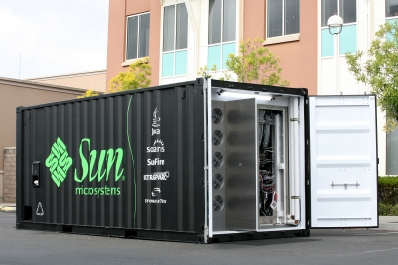
Image source: John Hoffmann’s Weblog
I’m back from a short trip to the beach, only to return to a massive thunder storms which lead to an extra long commute due to flooding and the sweet smell of raw sewage in Soho that was percolating in 90 degree summer heat. Ah… it’s good to be home.
With that said, let’s get back to Google. (Did you think I could go five posts without directly mentioning them?)
It’s funny because the spectrum auction has been a big deal in telecommunications circles every since the FCC made television broadcasters switch from analogue to digital, which freed the 700MHz band of spectrum in the first place. But Google makes news, and their public announcement of their concerns about the auction turns a business section article into front page news on the New York Times (albeit below the fold.) All this analysis leads to a lot second guessing. The what ifs and predictions can be fun and are an important part of the game, however separating the signal from the noise is difficult. More over, after a week passes, most people will move along with the rest of the blogosphere to the next bright and shinny news item, like the new iMacs. In the short window of coverage, it is easy to forget that Google has been concerned about access and pipes for a long time.
On that note, let’s return to 2005, when the internet was abuzz with rumors of Google buying up “dark fiber” and their mysterious job postings.
At the time, Robert X Cringely (who made the great documentary Triumph of the Nerds, not to be confused with the movie about a nerd fraternity of a similar title.) commented upon the dark fiber speculation and the even cool super-secret plans to building their own Internet using home grown US$500 million mobile data centers housed in shipping containers.
Two years later, we haven’t seen or heard much more about these plans. It is also interesting to note how Cringley opened his article:
“Google’s strengths are searching, development of Open Source Internet services, and running clusters of tens of thousands of servers. Notice on this list there is nothing about operating systems. There are many rumors about Google doing an operating system to compete with Microsoft. I’m not saying they aren’t doing that (I simply don’t know), but I AM saying it would not be a good idea, because it doesn’t play to any of the company’s traditional strengths.”
Two years later, Google hasn’t created a new internet, nor they have entered the desktop OS market. Although, they have rolled out word processors, spreadsheet, photo album and calendar tools to join their email service which launched on April 1, 2004, which overs a lot of people software application needs, even it isn’t specifically called an OS (but if it walks like a duck…) And Sun created something that looks a lot like what Cringley was talking about.
The internet is full of rumors and wild guesses at future actions. Cringley is smart enough to know that he can’t see into the future. Further, he is humble enough to put a section which lists his predictions and review his track record when he does make a prediction. He is currently batting 0.533, which is say that he is right a little more than half the time.
This abundant media speculation is good when it focuses national attention on important, but often dry, issues as interoperability and access to wireless networks and services. Getting people to wonder why they can’t use their mobile handset on a carrier of their choosing and why they can’t control their on-deck applications are important first steps to insuring fair and reasonable telecommunications policy. However, the telecommunication industry can change surprisingly quickly. Historic perspective helps put these changes in context. Amid these changes, we have to remember where we’ve been before, and even where we thought we were going.



